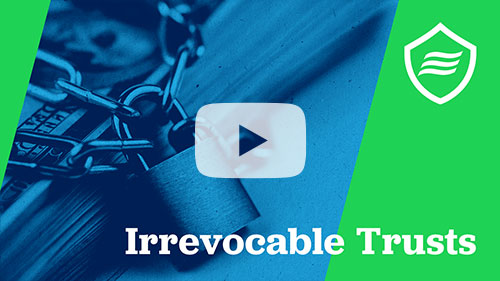IRREVOCABLE TRUSTS
Asset Protection, Tax Benefits & Estate Planning
Irrevocable trusts can protect assets, reduce estate taxes, avoid probate, and preserve your legacy.

What Is an Irrevocable Trust?
An irrevocable trust is a legal arrangement in which the trust creator (or grantor) permanently transfers assets into a trust and relinquishes their right to modify or revoke the trust agreement. This transfer removes the assets from the grantor's estate, creating a separate legal entity managed by a trustee for the benefit of the designated beneficiaries.
The defining characteristic of an irrevocable trust is its permanence—once established, the terms generally cannot be changed, and assets transferred into the trust no longer belong to the grantor. This permanence creates advantages for asset protection, tax benefits, and estate planning.
Key Components of an Irrevocable Trust
An irrevocable trust consists of several essential elements: the grantor (also called settlor or trustor) who creates the trust and transfers assets into it; the trustee who manages the trust assets according to the trust agreement; beneficiaries who receive benefits from the trust; the trust agreement that outlines the terms and rules; and trust assets which are no longer owned by the grantor.
How Irrevocable Trusts Function
When assets are placed in an irrevocable trust, they're removed from the grantor's personal holdings. The trustee assumes legal ownership and manages these assets according to the trust document. Because the grantor no longer controls these assets, they receive protection from creditors, lawsuits, and estate taxes.
The trust becomes its own tax entity with a unique tax identification number and may file its own tax returns. Income generated may be taxed to the trust itself, the beneficiaries, or in some cases, the grantor.

Types of Irrevocable Trusts
Irrevocable trusts come in many specialized forms, each designed to address specific planning objectives. Understanding the different types can help you determine which structure best suits your particular needs.


- Medicaid Asset Protection Trust (MAPT): A MAPT helps individuals qualify for Medicaid coverage for long-term care while preserving assets for heirs after the look-back period has passed.
- Special Needs Trust (SNT): An SNT provides for individuals with disabilities without jeopardizing their eligibility for government benefits such as Medicaid or Supplemental Security Income.
- Irrevocable Life Insurance Trust (ILIT): An ILIT is designed specifically to own life insurance policies, with death benefits avoiding estate taxes while providing immediate liquidity to beneficiaries.
- Charitable Remainder Trust (CRT): A CRT allows you to support charitable causes while receiving income during your lifetime, with assets eventually passing to your selected charity.
- Grantor Retained Annuity Trust (GRAT): A GRAT allows you to transfer appreciating assets to beneficiaries with minimal gift tax consequences while retaining the right to receive annuity payments for a specified term.
- Qualified Personal Residence Trust (QPRT): A QPRT allows you to transfer your home to beneficiaries at a reduced gift tax value while retaining the right to live in it for a specified period.
- Generation-Skipping Trust (GST): A GST allows assets to be passed to grandchildren or later generations while minimizing or avoiding generation-skipping transfer taxes.
- Spousal Lifetime Access Trust (SLAT): A SLAT allows one spouse to create an irrevocable trust for the benefit of the other spouse, removing assets from the estate while still maintaining indirect access to those assets.
Benefits of Irrevocable Trusts
Irrevocable trusts offer numerous advantages that make them essential tools in comprehensive estate planning
Medicaid Planning
By transferring assets to an irrevocable trust at least five years before applying for Medicaid (to satisfy the "look-back period"), individuals can preserve their legacy while receiving assistance with long-term care expenses. This strategy helps protect savings from being depleted by nursing home costs.
Asset Protection
Because assets in the trust no longer belong to the grantor, they're generally protected from creditors, lawsuits, divorce settlements, and business failures. This protection makes irrevocable trusts valuable for professionals in high-liability fields, business owners, and anyone concerned about future claims.
Estate Tax Reduction
Assets properly transferred to an irrevocable trust are removed from the grantor's taxable estate, potentially reducing or eliminating estate taxes. This benefit is particularly valuable for high-net-worth individuals whose estates exceed the federal estate tax exemption amount.
Income Tax Benefits
Depending on the structure, irrevocable trusts can provide various income tax advantages. Charitable trusts offer income tax deductions, certain trusts can shift income to beneficiaries in lower tax brackets, and specialized trusts can defer or minimize capital gains taxes on appreciated assets.
Avoiding Probate
Assets held in an irrevocable trust bypass the probate process, maintaining privacy, reducing settlement costs and delays, and ensuring a smoother transition of assets to beneficiaries. This probate avoidance saves time, money, and stress for beneficiaries.
Control Over Asset Distribution
Irrevocable trusts allow grantors to establish specific conditions for how and when beneficiaries receive assets. This control protects beneficiaries who may be financially inexperienced, creates incentives for certain behaviors, and establishes protections against a beneficiary's creditors or divorce.


Potential Drawbacks of Irrevocable Trusts
While irrevocable trusts offer significant advantages, they also come with important considerations.
Loss of Control
The most significant drawback is the permanent surrender of control over trust assets. Once transferred, the grantor generally cannot change beneficiaries, modify terms, access principal, or revoke the trust arrangement. This irrevocability requires careful consideration before implementation.
Complexity and Cost
Irrevocable trusts involve higher setup costs than simpler estate planning tools and entail ongoing administrative requirements. Trustee fees, separate tax filings, and accounting requirements increase the cost of maintaining the trust structure.
Inflexibility for Changing Circumstances
As circumstances change, the fixed nature of irrevocable trusts can become problematic. While techniques exist to modify irrevocable trusts in certain situations, these processes can be complex and costly.
Trustee Dependency
The success of an irrevocable trust largely depends on the trustee's capabilities and reliability. Choosing the wrong trustee can lead to mismanagement, family conflicts, or failure to achieve the trust's objectives.
When to Consider an Irrevocable Trust
Irrevocable trust planning is particularly beneficial in specific situations where their unique advantages can be maximized:
- Long-term care planning: To protect assets while potentially qualifying for Medicaid (after look-back period)
- Estate tax exposure: When your estate exceeds the federal estate tax exemption amount
- Asset protection needs: If you have significant concerns about potential creditors or liability exposure
- Professional vulnerability: For individuals in high-liability professions (doctors, business owners)
- Special needs planning: When providing for beneficiaries with disabilities while preserving benefits eligibility
- Charitable intentions: When balancing philanthropic goals with personal income needs
- Wealth appreciation: For transferring assets likely to significantly increase in value
- Multi-generational planning: When creating structured inheritance across several generations
These situations represent ideal scenarios where the benefits of irrevocable trusts typically outweigh their restrictive nature.
Irrevocable vs. Revocable Trusts: Key Differences
Understanding the distinctions between irrevocable and revocable trusts is essential for making informed estate planning decisions.
| Feature | Irrevocable Trust | Revocable Trust |
|---|---|---|
| Ability to modify | Generally cannot be changed after creation | Can be modified or revoked at any time |
| Asset ownership | Assets belong to the trust | Assets remain under grantor's control |
| Asset protection | Offers protection from creditors | Limited protection from creditors |
| Estate tax benefits | Assets excluded from taxable estate | Assets included in taxable estate |
| Probate avoidance | Avoids probate | Avoids probate |
| Income taxation | Trust typically pays taxes on undistributed income | Income taxed to grantor |
| Medicaid planning | Can help qualify for benefits (after look-back period) | Assets still counted for eligibility |
| Privacy | Provides privacy | Provides privacy |
| Control | Grantor relinquishes control | Grantor maintains control |
Frequently Asked Questions
Q: Can an irrevocable trust ever be changed?
Despite their name, certain modifications to irrevocable trusts may be possible through judicial modification, trust decanting, trust protector provisions, or unanimous consent of beneficiaries. These methods have specific requirements and limitations, making careful initial structuring essential.
Q: Who pays taxes on income generated by an irrevocable trust?
For grantor trusts, the grantor pays taxes on trust income despite no longer legally owning the assets. With non-grantor trusts, the trust pays taxes on undistributed income while beneficiaries pay taxes on distributed income at their individual rates.
Q: Can I serve as trustee of my own irrevocable trust?
Serving as trustee of your own irrevocable trust generally undermines its benefits for asset protection and tax purposes. However, with certain specialized trusts, you may retain limited trustee powers without compromising the trust's advantages.
Q: What happens if the trustee mismanages the trust?
If a trustee breaches their fiduciary duties, beneficiaries can request a detailed accounting, petition for the trustee's removal, seek damages for losses, request court intervention, or consider including trustee removal provisions in the original document.
Q: How does an irrevocable trust affect Medicaid eligibility?
Assets transferred to an irrevocable trust at least five years before applying for Medicaid—outside the "look-back period"—are generally not counted as available resources for eligibility purposes. Specific Medicaid rules vary by state, and trusts must be carefully structured








